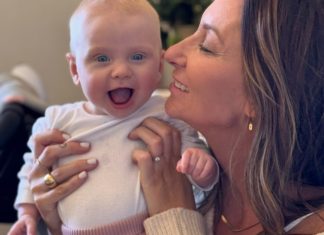By Danielle Galvin
For some parents, the decision on how many children to have is an agonising one, very often a source of great conflict.
When one parent wants just one more, and the other is adamant to be ’done’ having children.
Perhaps the discussion has changed over the years, and one party is left frustrated, scared, resentful.
For others, the decision appears easy.
Career progression, financial burdens and many other factors come into play, and both parents are on the same page.
But what about when the decision doesn’t seem so black and white?
Regardless, it’s an intensely personal one to make.
Ann Davidman is a renowned marriage and family therapist based in Oaklands, California who helps couples and mums decide if they want children in the first place.
She describes herself as a Motherhood Clarity Mentor and says regardless of whether the woman is a mother already or not, deciding to have another child, involves the same process.
Her advice is for women to start by setting aside what she calls the “external factors” clouding your judgement – whether that’s age, finances or even concerns about the world you’re bringing your child into.
“If you’re focussed on those factors, there’s no way to figure out what you want,” she said.
“That’s part of the process, identifying all those externals that pull at your psyche and put them aside.
“Figure out what’s in your heart, what you really want for you.”
She hastens to add that someone may want three children, but decide to have one or two because of certain conditions in their lives.
But it’s important to recognise that desire in a tangible way.
“When a couple already has a child and they are trying to figure out have a second, I don’t think you can have a conversation around what are the pros and cons, and how this will impact the child we already have,” she said.
“That is an important conversation – but the timing of that conversation needs to come after both of those people have gone to their own corners, and looked inside and (thought about) really what do I want just for me?
“When they each have that clarity, they need to share that with each other, not convince each other of how they each feel, but so each person can hold and honour what the other person feels and what they want.
“When both people feel like the other person really gets where they are at, then you can talk about what are the conditions or what would have to happen so we both are happy.”
Ms Davidman says the process doesn’t need to drag out, even though for many couples the battle is ongoing.
“There are people who are one of three siblings, so in their mind they should have three children, so that’s more about a projection,” she said.
Her advice is to know why you have made the decision – to stop having kids, or to try for another.
“I have a strong opinion, that if people know why they are making a decision, whatever that decision is, they will be much happier down the road,” she said.
When either parent remarks that they are “so done” it can mean different things for different people.
“The subtext of ‘I’m done’ can be either I’m done, I can’t take it anymore, I’m so exhausted, it can be reactive,” she explained.
“But it can also be a from a place of clarity, as much as I wanted another, I am done procreating, I am happy with the one or two children I have I want to give them everything I have, I don’t want to raise another child.”








